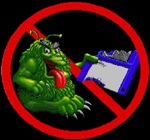 |
Amiga Antivirus Website |
 |
Index ☣ News ☣ Download ☣ Warnings ☣ Link ☣ Help ☣ Encyclopedia ☣ Unsorted ☣ Forum ☣ About ☣ FAQ ☣ Contact |
A computer virus is one type of malware that inserts its virus code to multiply itself by altering the programs and applications. The computer gets infected through the replication of malicious code. Computer viruses come in different forms to infect the system in different ways. Find some of the most common type of computer viruses here. A computer virus spreads through removable media, internet downloads, and e-mail attachments. In other words, a virus spreads while the user is viewing an infected advertisement, opening the attachment in the email, or clicking on an executable file. Besides that, connecting with an already infected removable storage device such as a floppy disk drive also spreads the infection. There are two ways by which a virus operates; the first type starts replicating itself as soon as it lands on the computer; the second type remains dormant until it is triggered. Therefore, it is essential to install an Anti-Virus software on your Amiga to avoid of all such threats. |
This type of virus infects the master boot record and it is challenging and a complex task to remove this virus and often requires the system to be formatted. Mostly it spreads through removable media, like a floppy drive. Example: SCA Virus |
A type of computer virus that inserts its malicious code into executable files on a system. When the infected file is opened or used the virus may overwrite the file and cause permanent damage to the content of the overwritten file. Example: Jeff Butonic Virus |
This common virus inserts malicious code into executable files — files used to perform certain functions or operations on a system. Example: Happy New Year Virus |
This is a general term for any virus that inserts itself in a computer system’s memory. A resident virus can execute anytime when an operating system loads. Example: Saddam Virus |
This type of virus spreads through multiple ways. It infects both the boot sector and executable files at the same time. Example: CCCP Virus |
Macro virus is a malicious program that uses scripts file commands or actions—within software applications to infect files, spread through systems, and execute harmful actions. Example: Sex Guide |
A Trojan horse or Trojan is a type of malware that is often disguised as legitimate software. Trojans can be employed by cyber-thieves and hackers trying to gain access to users systems. Example: Lurad trojan |
 |
 |
Denmark & Canada Copyright © 1995-2025 All Rights Reserved |
 |